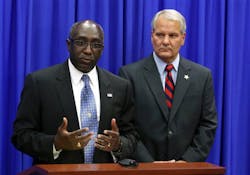Sanford Police Chief Cecil Smith was hired to lead the central Florida department just as it was thrust into the national spotlight by the George Zimmerman case.
And last week, after a jury acquitted Zimmerman, sparking a new round of national protests, it fell to Smith to keep the peace in town.
The previous chief had been fired by city commissioners for failing to arrest Zimmerman for the fatal shooting of Trayvon Martin, an unarmed teenager, in February 2012. Soon after, protesters rallied online and in streets across the country for Zimmerman's arrest. The governor appointed a special prosecutor, who charged the neighborhood watch volunteer with second-degree murder, laying the groundwork for the high-profile trial.
Smith's first months felt like triage, he said -- coping with perceptions of racial bias among the black community as well as low morale within the department of 128 officers.
Smith, 52, who is African American and was raised on Chicago's west side, where he had seen riots in 1968, knew what lay ahead if the city didn't address unrest before the verdict.
So he began taking to the streets each Thursday for what he calls "walk and talk." He and about a dozen officers walk around different neighborhoods, doubling back to revisit certain areas, including Goldsboro, the historically black part of town.
As the trial wound down, Smith met with the Seminole County sheriff and other local law enforcement officials to create contingency plans for the verdict. When the acquittal was handed down, Smith activated the local emergency operations center, doubling the number of police in the streets to about 50 at a time.
Some demonstrations across the country were marred by violence, including melees in Los Angeles and Oakland. But Sanford, a city of 54,000 about 25 miles north of Orlando, remained peaceful.
The streets stayed clear, the protests small and peaceful, with no arrests or clashes with police -- a credit to the new chief, many said, including city commissioners.
Still, Smith said that the Police Department needed to keep improving its community relations.
"We can choose to stay where we were, or we can say we don't like what's happened. But we need to come together and move on," Smith told about 70 people, mostly black Sanford residents, who gathered for an interfaith service at a local church Monday.
Smith looked more like a minister than a police chief in his glasses and sharp suit, pacing before the altar, exhorting the crowd. He told them he knew many were unhappy with the department and the verdict.
A few residents lobbed questions about an arrest during a protest at a lakefront park. Smith said the arrest took place in Goldsboro and was unrelated to the verdict.
"What we have to do is have people stop thinking every time police arrest somebody it's racist," he said. "We're trying to be as transparent as we can."
One woman told him that as news spread of the verdict, she saw police line young black men up on the boulevard that runs through Goldsboro, searching them without cause, even well-behaved youths who attend college.
"You can't feel our pain," she said.
Smith said he heard that a lot.
"People tell me you're not from around here, you can't understand," he said, asking them to work with him.
After talking for a few minutes, the woman decided to give Smith the benefit of the doubt.
"He walked into the lion's den," Rose Casey said. "We have to give him a chance to straighten things out."
Copyright 2013 - Los Angeles Times
McClatchy-Tribune News Service



